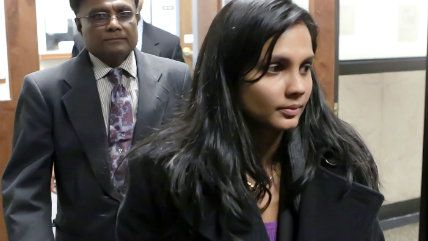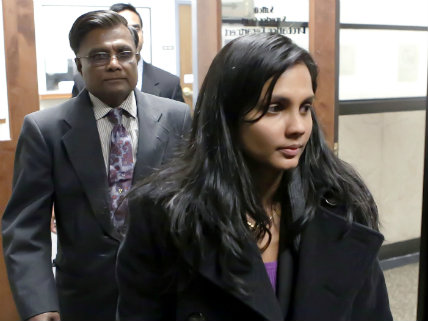ACLU Urges Mass. Court to Vacate 24,000 Drug Cases Based on Tainted Lab Evidence
Annie Dookhan tainted an estimated one in six drug cases in Massachusetts over a nine-year period. The ACLU says all those cases should be thrown out.


A single bad chemist corrupted an estimated one in six drug convictions in Massachusetts between 2003 and 2012, throwing the state's legal system into havoc. The only way to properly fix it, the American Civil Liberties Union argued in a brief to the state's high court on Friday, is to vacate thousands of convictions based on her work.
The ACLU is asking the Massachusetts Supreme Judicial Court to vacate more than 24,000 drug convictions based on tainted evidence from one of the biggest drug lab scandals in the country. When state chemist Annie Dookhan pled guilty in 2012 to falsifying positive results in thousands of drug samples over a nine-year period, it set off a massive review of possibly compromised cases, as well as state investigations into the misconduct that ultimately led to the closing of the drug lab where Dookhan worked.
While the Dookhan affair is one of the largest drug lab scandals, it is far from the only one. Junk science and lack of independent labs plague the criminal justice system. In July, Houston officials announced they had identified 298 wrongful convictions based on faulty roadside drug tests. In March, New Jersey state officials said a lab technician for the state police allegedly falsified drug test results, possibly affecting 7,827 cases.
The Massachusetts Supreme Judicial Court ruled in July that so-called Dookhan defendants could rescind their guilty pleas and seek a new trial without facing additional charges or harsher sentences. However, the ACLU argues that there is no feasible way to individually review the drug cases tainted by the scandal. According to the ACLU and local public defenders service, it would take 48 years to assign public defenders to each of the 24,483 defendants potentially harmed by the lab's dirty work.
"The Commonwealth's indigent defense system has no more capacity to litigate all these cases than it does to build a rocket ship and fly it to Jupiter," the groups argue in the brief.
The state says that the vast majority of these cases never went to trial as a result of guilty pleas, limiting the impact of the court system. "Given the speed and efficiency with which we've tackled the [Dookhan] crisis, we're confident it will present a minimal disruption'' to the court system, a spokesperson for the Suffolk County District Attorney told The Boston Globe earlier this year.
However, the civil liberties groups say that without sweeping action, thousands of potentially tainted convictions will go unchallenged. According to the ACLU, more than 60 percent of the the drug charges against the Dookhan defendants were for simple possession, not drug dealing. Felons are barred from voting and owning guns in Massachusetts. Convicted defendants may have also faced lost jobs, lost custody of their children, being kicked out of or rejected for public housing, and deportation. One defendant whose case has already been vacated by the court is Daniel Francis, who served more than five years in state prison before being deported to Jamaica.
"If this status quo prevails, the Dookhan crisis will come to a close by allowing thousands of tainted convictions to stand unaddressed. That is not justice," the brief says. "There is only one way to vindicate the due process rights of Dookhan defendants and to restore the integrity of the justice system. Their convictions should be vacated and dismissed."
The Massachusetts Department of Public Health called Dookhan a "rogue chemist" when news of her misconduct first broke, but less than a year later, it was revealed that another staffer in the same lab, Sonja Farak, was regularly high on a galaxy of drugs—crack, methamphetamines, ketamine, and LSD, among others—that she pilfered from the lab. Farak's actions may have tainted an additional 18,000 cases over the eight years she was at the drug lab.


Show Comments (154)